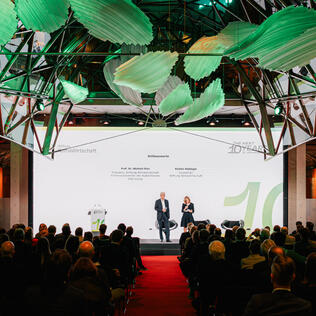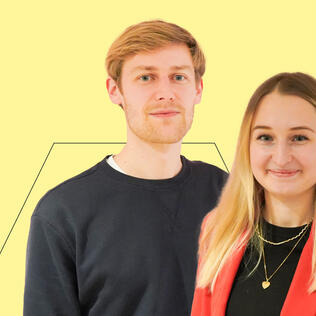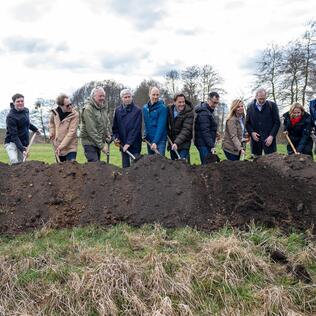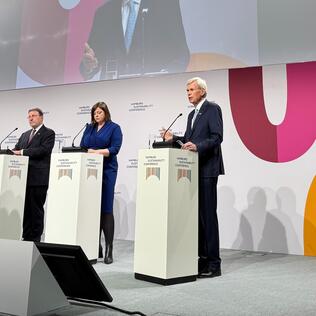Environmental responsibility

The protection of our planet has been a tradition at the Otto Group, as environmental protection was established as a corporate goal as early as 1986. Today, we work with ambitious targets to further reduce our ecological footprint. We consider the impact of our products on climate, ecosystems, and society throughout their entire lifecycle: from raw material extraction to production conditions, material usage, and shipping, all the way to customer use and disposal. We want to ensure that our goals and activities are aligned with the 1.5-degree target of the Paris Climate Agreement. Additionally, we are working to reduce our resource consumption. The greatest impacts can be achieved through the use of materials, particularly regarding textile fibers, wooden furniture, electronics, catalog paper, and packaging. In this context, we are increasingly focusing on circular solutions.
Stories on environmental responsibility
Environmental responsibility in detail
Climate protection
Climate protection became part of our corporate strategy as early as 1986. Since then, we have achieved a lot. For example, CO₂ emissions from our own operations have been reduced by more than half from 2006 to 2020, and by an additional 30 percent by the end of 2023 (compared to the base year 2018) – completely without compensation. We want to ensure that our goals and activities are aligned with the 1.5-degree target of the Paris Climate Agreement. Therefore, in 2022, we committed to developing an ambitious and comprehensive Science-Based Target (near-term SBT) that addresses our entire value chain. The SBT is a scientifically based reduction target for greenhouse gas emissions that is in line with the 1.5-degree target of the Paris Climate Agreement. We submitted our SBT for validation to the Science Based Target Initiative (SBTi) in spring 2023 and successfully completed the validation process by the end of February 2024.
Circularity
Besides consistent climate protection, circularity is the only plausible answer to the question of how our economic model can function within planetary boundaries while maintaining the stability of ecosystems and human livelihoods. To keep materials and products in the loop for as long as possible through circular design, appropriate usage models such as second-hand, repair, and recycling options, we look at the entire value chain. By the end of the 2035/36 financial year, we aim to shift the majority of our most relevant assortments (textiles, furniture, and electronics) to products that meet eco-design criteria. Additionally, we will provide largely circular solutions (reuse, repair, or recycling) for these assortments and continuously increase their implementation.
Preferred materials
Materials such as wood and cotton are a crucial basis for the design of fully circular products. Therefore, we are working to increasingly shift to more sustainable alternatives in all our products, such as FSC®-certified wood or organic cotton. The long-term goal of the Otto Group is to exclusively use preferred materials in the most relevant assortments (textiles, furniture, and electronics) by the end of the 2035/36 financial year. These materials will have lower negative impacts on the environment compared to conventional alternatives. We focus on the key materials: fibers, wood, plastics, and metals.
Animal and species protection
The Otto Group has been a pioneer in animal welfare: As early as 1988, we removed furs from endangered species or poorly kept animals, such as minks, martens, and sables, from our product range. Since 1991, real fur has been completely banned from our offerings.
Regarding our animal welfare-related products, we adhere to the following principles outlined in our Animal Welfare Policy:
- We commit to adhering to animal protection based on applicable international and national conventions, laws, and frameworks, such as the "Five Domains".
- We do not allow products or product components from endangered animals.
- We continuously develop our approaches in collaboration with key stakeholders and based on new insights in the fields of animal protection and animal welfare. Our requirements are regularly reviewed to ensure their relevance and to meet our standards.
We also reject products that contain mohair or angora, as well as those derived from live plucking and foie gras production. Additionally, the use of mulesing practices is prohibited. We continuously increase the use of industry-wide material standards and have set a goal to use only down, feathers, sheep, alpaca, llama, and cashmere wool that is certified according to an accepted independent recycling or animal protection standard starting in 2028. Since 2024, only leather as a byproduct of food production from the following domesticated animal species is permitted: cattle, buffalo, pigs, goats, sheep, and yaks.
Furthermore, the Otto Group has been a member of the international "Fur Free Retailer" program since 2014, whose signatories commit to not using real fur. This goes beyond our previous self-commitment to fur-free policies and sends a clear public message for animal protection.
Handling of chemicals
Chemicals play an important role at various stages of the textile value chain to ensure properties such as color, elasticity, and quality. The Otto Group is particularly committed to safe and environmentally friendly handling of chemicals in factories involved in wet processes (dyeing, washing, printing). To achieve this, we launched the BHive project in 2021, which we have been continuously developing since then. The goal is to gain more transparency about the chemicals used and thus contribute to a more conscious, environmentally friendly, and resource-efficient approach.
Product safety
The products we bring to market meet high quality standards – often exceeding legal requirements. This applies to both potentially hazardous residues and general product safety. Stricter guidelines are in place for children's clothing and toys.





